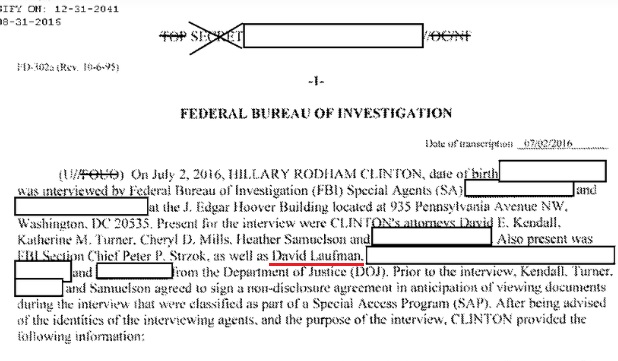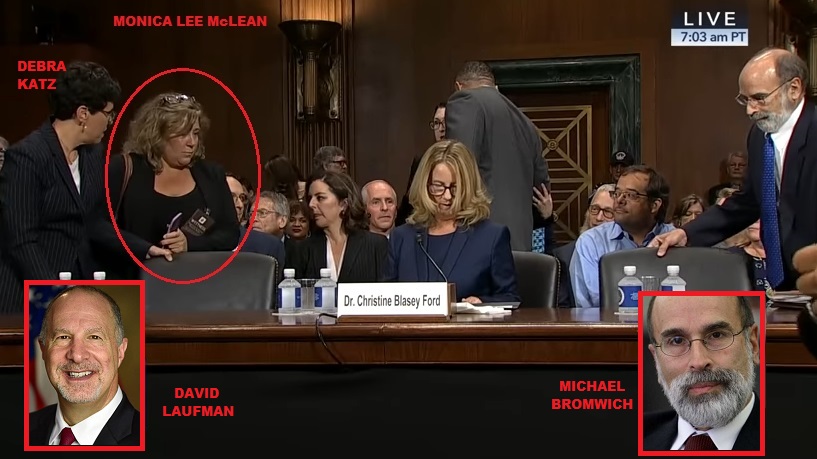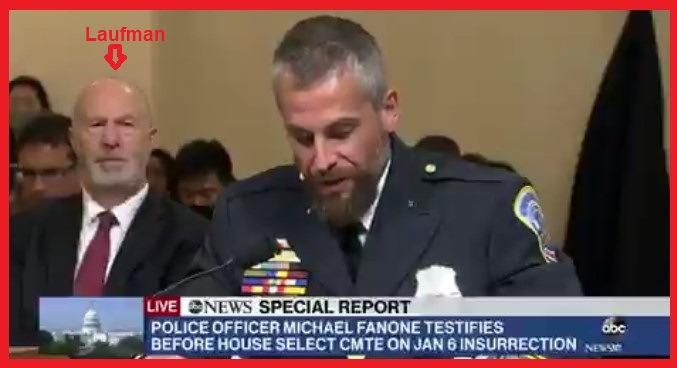The all too familiar David Laufman says it out loud, but few will pay attention. “That’s what this is. It- just because [the DOJ-NSD justification for the raid on Trump] implicates classified information to me, doesn’t seem to give a platform for the House Intelligence Committee to intrude at this time,” Laufman says.
In the aftermath of 9-11 the U.S. government created the Dept of Homeland Security (DHS) to conduct surveillance of “domestic threats,” the American people. When Barack Obama and Eric Holder stepped in a few years later, they created the DOJ National Security Division (DOJ-NSD). This division specializes in weaponizing surveillance against their political enemies. The DOJ-NSD had no inspector general oversight and operates within Main Justice, but above the law. Essentially, they use the justification of ‘national security‘ to defend the Fourth Branch of Government, the permanent surveillance state. {Go Deep}
 David Laufman was the former head of the DOJ-NSD and he specialized in the targeting process. Laufman was a primary player in the defense of Hillary Clinton against accusations of ‘national security violations’ as a result of her classified personal email use. Laufman sat in on, guided and shaped the FBI interview Hillary Clinton. Additionally, David Laufman is one of Christine Blasey-Ford’s Rehoboth “beach friends,” as outlined in the Judge Brett Kavanaugh confirmation hearings.
David Laufman was the former head of the DOJ-NSD and he specialized in the targeting process. Laufman was a primary player in the defense of Hillary Clinton against accusations of ‘national security violations’ as a result of her classified personal email use. Laufman sat in on, guided and shaped the FBI interview Hillary Clinton. Additionally, David Laufman is one of Christine Blasey-Ford’s Rehoboth “beach friends,” as outlined in the Judge Brett Kavanaugh confirmation hearings.
When Blasey-Ford said she wrote the letter to Senator Dianne Feinstein accusing Brett Kavanaugh of college rape, she was with a bunch of “beach friends” including former FBI public information officer Monica McLean who actually wrote the letter. When investigators began digging into the background of the letter construct, McLean came under legal scrutiny. McLean hired beach friend David Laufman to shield her from legal trouble and represent her legal interests. David Laufman then worked together with another former DOJ lawyer, Michael Bromwich, who represented Christine Blasey-Ford. That’s the network.
Fast forward to 2022. All network indications reflect that David Laufman, similar in effort to former DOJ-NSD head Mary McCord (Schiff congressional impeachment team), is one of the primary Lawfare agents currently guiding, mapping and counseling the use of the DOJ-NSD to continue the targeting of Donald Trump. Laufman provides the legal strategies for the people within the current DOJ-NSD to follow. In addition to being a familiar face on MSNBC, we should consider David Laufman the outside agent providing guidance to Main Justice intent.
In this CBS interview, David Laufman is questioned about the role of congressional oversight in the DOJ/FBI raid on Mar-a-Lago. Pay close attention to what David Laufman says, because he essentially admits the quiet part. There’s no role for any oversight, any check and balance in the system, because the DOJ-NSD operates above the law. [Transcript] – WATCH:
ED O’KEEFE: Now for a more detailed look at all of the legal problems swirling around former President Donald Trump. We’re joined by Rikki Klieman, criminal defense lawyer and a CBS News legal analyst. And here in Washington, David Laufman, former chief of the Justice Department’s counterintelligence and export control section. Great to have both of you with us. David, I want to begin with you. You’re the former head of the division of the Justice Department that’s now led by a guy named Jay Bratt who argued in court this week regarding the potential release of this affidavit, that it may quote, “chill future cooperation by witnesses whose assistance may be sought as this investigation progresses, as well as in other high profile investigations.” You agree with his assessment?
FORMER CHIEF OF COUNTERINTELLIGENCE DAVID LAUFMAN: Based on my experience with the Department of Justice, that’s absolutely correct. Especially in the early stages of an investigation, the Justice Department and the FBI want to do everything they can to protect the integrity and confidential law enforcement actions that are being taken.
ED O’KEEFE: Do you have any sense then, do you expect he’s going to release at least part of this or a redacted version?
LAUFMAN: I think the Justice Department knows it has to come back to the court with a reasonable proposal. The judge signaled pretty clearly that he wants to release some facets of this affidavit. And I think the Department and the FBI are now trying to come to grips with what they can live with- with regard to public disclosures. And there are some portions of the affidavit that I think they’ll be willing to make public.
ED O’KEEFE: You just heard Congressman Turner of Ohio talking about the possibility of the Intelligence Committee getting read into the details of this at some point. There is bipartisan agreement that they’ve got to hear something from the Justice Department. It’s just a question of when and what exactly and how much. But in your view, is there a requirement for the Justice Department and FBI to do that at all?
LAUFMAN: I mean, there’s no requirement. Look, I mean, there’s- this- there are sometimes classic collisions between two coordinate branches of government; does seem to be premature for Congress to be sticking its nose into an ongoing criminal investigation. That’s what this is. It- just because it implicates classified information to me, doesn’t seem to give a platform for the House Intelligence Committee to intrude at this time.
ED O’KEEFE: Because it could unspool in a way where the information you share with them is leaked. And then, the investigation’s compromised. Its ability to have a fair trial will be compromised.
LAUFMAN: I think they’re trying to create a kind of a carnival atmosphere under the patina of the exercise of Congress’s constitutional authority to conduct investigations.
ED O’KEEFE: Rikki, to you. Allen Weisselberg, the former longtime chief financial officer of the Trump Organization, this past week pleaded guilty to 15 counts of fraud and tax evasion as part of the scheme to receive more than $1.7 million in off-the-books perks and compensation from the Trump Organization. Important to point out the former president hasn’t been charged as part of this civil case. But based on what you know about this case, what we’ve seen so far, is there any legal risk at this point to a member of the Trump family?
CBS NEWS LEGAL ANALYST RIKKI KLIEMAN: There is hardly any legal risk because of the fact that the plea of Alan Weisselberg is against the Trump Organization, which really means the Trump Corporation and the Trump Payroll Corporation. It had to do with the fact that he received perks to, as you say, $1.7 million over a period of years. The plea bargain seems abundantly clear. He is testifying against entities, not people.
ED O’KEEFE: And there’s been so much focus in the past two weeks on the Mar-a-Lago operation, this Weisselberg guilty plea this past week, but I know you believe that it’s what’s going down in Georgia that is potentially most legally risky for the former president. Correct?
KLIEMAN: There is no doubt in my mind that the most risk to the former president is in fact the Georgia investigation. And one of the reasons I say that is because it has intensified in terms of the number of witnesses that the district attorney is calling before this special, investigative grand jury. But also the fact that should not be overlooked is that Donald Trump has hired one of the best criminal defense lawyers in the country in the person of Drew Findling. Drew Findling was a past president of the National Association of Criminal Defense Lawyers. He is based in Atlanta. He knows how to work within the system ethically and properly and he’s fierce. So when we look at this particular situation, Rudy Giuliani called to testify last week. We have no idea nor should we have any idea in a secret proceeding what he said or if he took the Fifth Amendment at any point in time. This week, Lindsey Graham is set to testify on Tuesday, unless the 11th circuit issues a stay and buys into his argument that his phone calls involving this election in 2020 and the results when he wanted, allegedly, to say that they should look into the mail in ballots, and perhaps there were many of the mailing ballots that had faulty signatures and his communications with Donald Trump would be the focus of this particular special grand jury. And that he wants to say, well, no, that was within my duties within the Speech and Debate Clause. We’re going to see what the 11th circuit has to say about that. But I expect Lindsey Graham is going to have to testify. This grand jury is investigative only. They can issue a report that would tell the district attorney at a later point in time, whether or not she does have reason to indict probable cause to indict any of the players, including Donald Trump.
ED O’KEEFE: And, David Laufman, in terms of the operation of Mar-a-Lago at this point, how concerned should any current or former staff of the former president there be concerned about legal exposure?
LAUFMAN: Well, I think any- any individuals who were involved in removing classified information from the White House in the waning moments of the Trump administration, taking them to Mar-a-Lago, knowingly keeping them there to play certain unauthorized to be, has potential criminal jeopardy depending on all the facts and circumstances that investigation uncovers. One of the statutes referenced in the search warrant is the Espionage Act and at issue in principle is a provision that makes it a crime to willfully retain National Defense Information. And the fact that these were highly classified documents as high as top secret code word makes it pretty clear to me the president has potential jeopardy here, compounded by what appeared to be deliberate misrepresentations by the president or his team, to the government about whether classified information remained at Mar-a-Lago and hence, the obstruction statute reference in the search warrant.
ED O’KEEFE: Ricky, you’ve been at this for a long time tracking legal cases of all sorts all across the country. Have you ever seen anyone facing more than a dozen legal, civil, congressional investigations at one time? And what is it like being an attorney for someone like that, when they have competing, compounding legal concerns and interests?
KLIEMAN: I have never seen this many investigations happening all at the same time. Some in greater stages, some in lesser stages. But if you are an attorney for Donald Trump, you are well advised to separate each one and decide where you’re going to devote your energies. Donald Trump, it appears, has been hiring lawyers from different places. So one lawyer does not have all of the responsibility. But this is not a good time for Donald Trump, at least if he thinks that everything is coming in upon him. However, we also know that Donald Trump enjoys the chaos and we will see what happens in terms of his decision if he is going to run or not in 2024.
ED O’KEEFE: We sure will. Rikki Kleiman, CBS News legal analyst, David Laufman, former Justice Department official, thank you both for being here. And we’ll be right back. (link)
From the corrupt Clinton investigation; to the corrupt us of the FISA application against Donald Trump’s campaign; to the corrupt Brett Kavanaugh confirmation hearings; to the corrupt J6 targeting and political midterm election effort; all the way to the ongoing targeting of Donald Trump, David Laufman is the one constant in an ever-evolving DOJ-NSD narrative.



